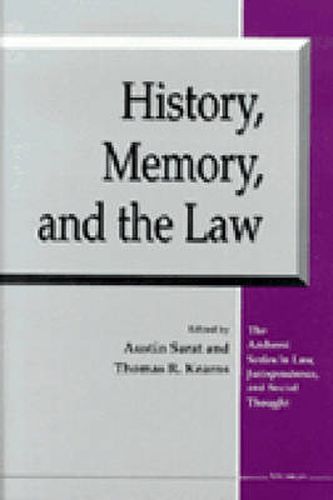Readings Newsletter
Become a Readings Member to make your shopping experience even easier.
Sign in or sign up for free!
You’re not far away from qualifying for FREE standard shipping within Australia
You’ve qualified for FREE standard shipping within Australia
The cart is loading…






The essays in this book examine law as an active participant in the process through which history is written and memory is constructed. Instead of seeing law as a victim of history, the writers treat law as an author of history, not just in the instrumental sense in which law can be said to make a difference in society, but in the ways that law constructs and uses history. Law looks to the past as it speaks to present needs. In the production of judicial opinions–supposedly definitive statements of what the law is–judges reconstruct law’s past, tracing out lines of legal precedent that arguably compel their decisions. These essays consider how law treats history, how history appears in legal decisions, and how the authority of history is used to authorize legal decisions. Furthermore, law plays a role in the construction of memory. The writers here ask how law remembers and records the past as well as how it helps us to remember our past. Law in the modern era is one of the most important of our society’s technologies for preserving memory. In helping to construct our memory in certain ways law participates in the writing of our collective history. It plays a crucial role in knitting together our past, present, and future. The essays in this volume present grounded examinations of particular problems, places, and practices and address the ways in which memory works in and through law, the sites of remembrance that law provides, the battles against forgetting that are fought in and around those sites, and the resultant role law plays in constructing history. The writers also inquire about the way history is mobilized in legal decision making, the rhetorical techniques for marshalling and for overcoming precedent, and the different histories that are written in and through the legal process. The contributors are Joan Dayan, Soshana Felman, Dominic La Capra, Reva Siegel, Brook Thomas, and G. Edward White. Austin Sarat is William Nelson Cromwell Professor of Jurisprudence and Political Science and Professor of Law, Jurisprudence, and Social Thought, Amherst College. He is past President of the Law and Society Association and current President of the Association for the Study of Law, Culture, and the Humanities. Thomas R. Kearns is William H. Hastie Professor of Philosophy and Professor of Law, Jurisprudence, and Social Thought, Amherst College.
$9.00 standard shipping within Australia
FREE standard shipping within Australia for orders over $100.00
Express & International shipping calculated at checkout
The essays in this book examine law as an active participant in the process through which history is written and memory is constructed. Instead of seeing law as a victim of history, the writers treat law as an author of history, not just in the instrumental sense in which law can be said to make a difference in society, but in the ways that law constructs and uses history. Law looks to the past as it speaks to present needs. In the production of judicial opinions–supposedly definitive statements of what the law is–judges reconstruct law’s past, tracing out lines of legal precedent that arguably compel their decisions. These essays consider how law treats history, how history appears in legal decisions, and how the authority of history is used to authorize legal decisions. Furthermore, law plays a role in the construction of memory. The writers here ask how law remembers and records the past as well as how it helps us to remember our past. Law in the modern era is one of the most important of our society’s technologies for preserving memory. In helping to construct our memory in certain ways law participates in the writing of our collective history. It plays a crucial role in knitting together our past, present, and future. The essays in this volume present grounded examinations of particular problems, places, and practices and address the ways in which memory works in and through law, the sites of remembrance that law provides, the battles against forgetting that are fought in and around those sites, and the resultant role law plays in constructing history. The writers also inquire about the way history is mobilized in legal decision making, the rhetorical techniques for marshalling and for overcoming precedent, and the different histories that are written in and through the legal process. The contributors are Joan Dayan, Soshana Felman, Dominic La Capra, Reva Siegel, Brook Thomas, and G. Edward White. Austin Sarat is William Nelson Cromwell Professor of Jurisprudence and Political Science and Professor of Law, Jurisprudence, and Social Thought, Amherst College. He is past President of the Law and Society Association and current President of the Association for the Study of Law, Culture, and the Humanities. Thomas R. Kearns is William H. Hastie Professor of Philosophy and Professor of Law, Jurisprudence, and Social Thought, Amherst College.